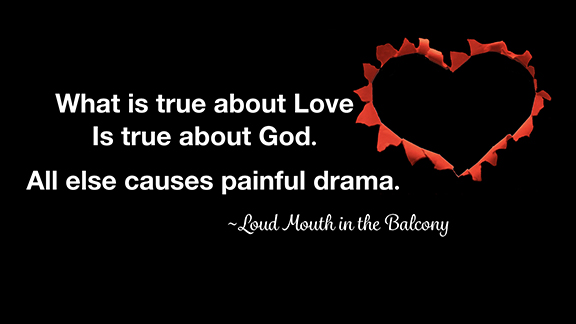I know you’re wondering: Is the balcony so high in the stratosphere that the Loud Mouth has become light-headed? How on Earth did she connect God to the King of Pop, an Army psychiatrist accused of killing fellow soldiers, and a random black guy named Ricky?
There’s a logical explanation: For starters, all three souls were made in the image of God (as immortal spirits, not mortal bodies), and all three are associated with some kind of extremism: Major Nidal Hasan for his religious beliefs, Michael for his uh, lifestyle—and let’s face it, black guys named Ricky (or anything else) have been known to evoke extreme behavior in some people.
In recent weeks, I have been blessed to observe in-your-face performances by these three fascinating characters: Michael, in his documentary, “This Is It,” Rick Stone in the newest production at the Black Ensemble Theater, “The Message Is in the Music: God Is a Black Man Named Ricky,” and Major Hasan, in the alleged murderous rampage at Ft. Hood, Texas. (A hyperlink to this violence was intentionally excluded.)
Behind the scenes of two highly entertaining musicals and one absolute horror, I could clearly see God—three perceptions of God, anyway. I sat in awe as Michael Jackson extracted absolute lock-step perfection from each member of his performance team, without drama queen antics such as condescending rants or other displays of anger. He demanded nothing of his production team—more accurately, his family—that he did not demand of himself.
When he showed up for work, he was ready to perform at peak levels, and ready to inspire greatness in others. He was as precise in his movements as he was in his directions, clearly explaining what he wanted and why he wanted it. Mostly, he wanted to give audiences “awareness, awakening and hope”—an unusual mission for performers, but apparently typical of Michael.
He held each member of his performance family in high regard, edifying their excellence and affirming their ability to meet his extraordinarily high standards. From that basic premise, he consistently and lovingly elevated them to an even higher level of perfection.
I sat watching much more than another stellar performance by Michael Jackson the entertainer. I was eavesdropping on a powerful Master Teacher. No matter who we are and what we’re doing, we are constantly revealing what we believe about God through our treatment of others–particularly those over whom we have some control or influence.
Beyond the quest for dazzling choreography, perfect rhythms and pitches, Michael showed us his God. He led with Light, respect and unconditional love, rather than fear and intimidation. For that, he will continue to be loved and admired beyond death’s door.
On a different stage, genius playwright/director/producer Jackie Taylor has crafted the starring role in her latest feel-good hit, “The Message Is in the Music,” from a similar model of God. In this uproarious musical, chock-full of expertly executed tunes from The Beatles, The Drifters, Gladys Knight, Curtis Mayfield (for whom God seemed to have a particular fondness), Paul Simon, The Temptations, Stevie Wonder and other old-school faves, Lucifer goes to God’s house, raising absolute hell and predictably threatening to destroy the Universe.
Unpredictably, he’s greeted by a God (a black man named Ricky) who is unflappable, making it utterly impossible to goad him into fury or a fight. God—and Thinkers—know that the devil only has as much power as others give him. In this play, God gave him absolutely none.
Taylor’s script dramatized what psychiatrist and spiritual teacher David R. Hawkins, M.D., Ph.D. revealed in his enlightening book, Power vs. Force. Power and force are often thought to be synonymous. They are not.
Power, as Dr. Hawkins so eloquently explained, does not involve force. In fact, it is its antithesis, which means that “May the Force be with you” might actually be a curse rather than a blessing.
So how are we to respond to force? Well, if Taylor’s characterization of God offered any clues, the most appropriate response to taunting rants is to retire for a refreshing nap. I was tickled that on the Black Ensemble Theater stage, as on Earth’s stage, God was the only one who seemed to know that force never wins. As He rested, His angels finally figured it out, and saved the world by showering the devil’s marauders with unconditional love, acceptance and forgiveness. I guess that’s why it’s called “overpowering” the enemy rather than “overforcing.”
After the former demons surrendered themselves to the Light, they groveled at God’s feet, as they had been required to do for the devil, bemoaning their unworthiness to be in His presence. God not only deflected their praise, He declared that their innately divine nature was the only truth He knew about them.
The moral: True Power uplifts. Force, on the other hand, can only destroy.
We see it every day. When the God of Force took center stage at Fort Hood, non-Muslims started pointing fingers, judging, disparaging and condemning. But the truth is that most, not all, of the followers of the world’s religions, including Christianity, believe that God is forceful. Their behavior often reflects it. They are angry, disrespectful, judgmental and condescending. Righteous indignation is their schtick. Power is not part of their act. They’re showing us the God whom they worship, and we show them ours.
Just this morning, a Facebook friend angrily attacked a Palestinian who had posted something disagreeable on his “wall.” His tirade triggered a torrent of “shame on you” responses from FB friends who seemed to know him; I don’t. Defensively, this man, who apparently considers himself a Christian, posted Bible passages that supported his wrath-filled response–scriptures that portrayed God as angry, vindictive, destructive and unforgiving.
Since his premise seemed to be that the Bible is the Word of God, the Loud Mouth was compelled to ask: Where do Matthew 7:1-3 (The famed “Judge not…condemn not…How can you see the speck in your brother’s eye but can’t see the log in your own eye?” scriptures) fit into his scenario? At this late hour, his silence must mean that he’s still crafting a very thoughtful response to that question.
Fascinating stuff. We can find a verse in the Bible to justify everything from genocide to generosity, so we pluck a scripture that’s appropriate for the situation at hand, and declare ourselves vindicated. The Bible Tells Me So: Uses and Abuses of Holy Scripture provides some memorable examples of this, punctuating my belief that those who read only one religious book rob themselves of deeper insights into God, themselves, and the world of the scribes who created the collection of texts.
Maybe, if we read more, and exercised our thinking muscle more frequently, we might discover that our angry, attack responses are peculiar to humans, are historically barbaric and emotionally immature. There is no Light. There is no Love. There is no forgiveness. That can only mean that this is not divine behavior.
I was standing near a table at the food court in Water Tower Place yesterday when a boy who appeared to be around seven years old dropped his toy car onto the floor directly in front of me. I stepped back so that he could retrieve it. Seconds later, his brother’s car crashed onto the floor. There was no harm done; but the older boy leaped from his chair and pounded his brother in the back so hard that the guy standing in line ahead of me gasped in horror, and so did I. There was no adult at the children’s table.
The older boy, about nine or ten years old, stormed away, leaving his little brother whimpering in pain. When he returned, his victim’s eyes followed him closely. When he turned his back, the younger boy attacked him from behind, viciously pummeling his brother with the front end one of the cars until he howled in pain.
Both attacks were barbarically human and emotionally immature. Similar acts are mirrored throughout the planet every minute. The fact that scriptures in most world religions justify this conflict resolution behavior should be cause for alarm; but it isn’t. We don’t become alarmed until someone kills innocent people at Columbine, an Amish school, Virginia Tech, a South Side Chicago high school or Fort Hood.
We have nurtured a violent society and we see no relationship between that brutality and our beliefs. It’s always amazed me that we can’t look at Bible scriptures, which were physically written by humans, and classify them into one of two categories: Divinely Inspired and Definitely Inhumane. It’s even more amazing that we don’t realize that every scripture that we freely accept as the Word of God directly impacts our behavior and our children’s behavior.
We pass along our beliefs; we teach our kids that God responds with anger, force and sometimes inhumane brutality. Then we tell them that it’s wrong for them to respond that way. Jesus, we tell them, told us to turn the other cheek. But we also tell them that Jesus is God. What are they to think: God is bi-polar–or worse, a hypocrite?
After headlines scream of another unconscionably brutal act, we cry in anguish and disgust, “Why are our kids so violent? What’s wrong with them?” We march in the streets, attend prayer vigils, wear bracelets, pins and carry big signs so that the TV audience can see that we oppose violence; then we return to our computers and play Mafia Wars, lured like six million others by an ad that proclaims, “Surround yourself with thugs, thieves, crooks and bad guys. And that’s just your family. Trust me, you’ll love it!”
Almost daily, we update our status to brag that we’ve graduated to a higher level in the Mafia because we’ve committed a more heinous act of inhumanity. Often we solicit our Facebook friends to help us brutalize some prospective Mafia Wars victim.
We don’t understand that our thoughts reflect our consciousness. We play violent games, engage in virtually violent acts, watch violent TV and movies, read ancient stories of brutality against humans, sometimes committed by an angry unloving God, and we wonder why we don’t feel safe any more.
We’re merely witnessing what our beliefs about God look like when they’re acted out on our world’s stage. If we insist on believing in an angry vindictive God that solves problems by killing people, we must share responsibility for the fiendish acts of those who also hold those beliefs. We co-created those scenes.
Or, we can follow the God of Michael: Start with the Man in the Mirror.
 There is nothing complicated about Love itself; in fact, Love is quite simple. Humans make it difficult. That’s why so few of us truly understand it—particularly those who say, “God is Love,” and then contradict themselves with claims that constitute accusations that God does things that only a demon would do.
There is nothing complicated about Love itself; in fact, Love is quite simple. Humans make it difficult. That’s why so few of us truly understand it—particularly those who say, “God is Love,” and then contradict themselves with claims that constitute accusations that God does things that only a demon would do. 


 How did the father react in Jesus’s story? He spotted his prodigal son from a distance and ran to greet him with open arms. He clothed him in fine garments and ordered a feast, much to the dismay of his older and much more respectful son.
How did the father react in Jesus’s story? He spotted his prodigal son from a distance and ran to greet him with open arms. He clothed him in fine garments and ordered a feast, much to the dismay of his older and much more respectful son. We see God through the only lens we have: Human. Our vision is myopic at best, egoic at worst, and assures distortion of the image. Our visual field is somewhat of a box—containing and confining. We’ve placed God there, where we can observe but not experience.
We see God through the only lens we have: Human. Our vision is myopic at best, egoic at worst, and assures distortion of the image. Our visual field is somewhat of a box—containing and confining. We’ve placed God there, where we can observe but not experience.